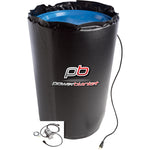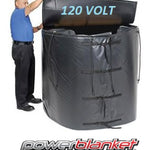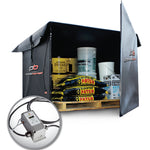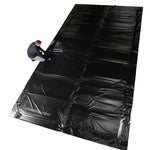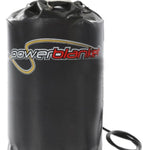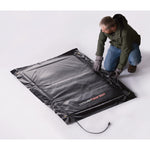You have no items in your shopping cart.
Article At-a-Glance
What Are Electric Heat Exchangers and How Do They Benefit Industrial Applications?
Electric heat exchangers, such as screwplug immersion heaters, are efficient and durable heating elements that directly transfer heat to fluids or gases, making them ideal for industrial applications requiring precise temperature management, like chemical processing and food production.
Key Takeaways
- Efficient Heating: Screwplug immersion heaters offer direct and efficient heating by submerging the element in the fluid, ensuring rapid temperature control and energy savings in industrial applications.
- Durability and Material Strength: Constructed from robust materials like stainless steel, Inconel Alloy, or Hastelloy, these heaters withstand high temperatures and harsh environments, making them ideal for demanding industrial settings.
- Versatile Applications: Suitable for a wide range of industries, including chemical processing, petroleum refining, and food production, screwplug immersion heaters can effectively heat large volumes of liquids or gases.
- Compact and Easy Installation: With a smaller footprint, these heaters are perfect for tight spaces, offering flexibility and ease of installation without compromising performance.
- Enhanced Process Control: By providing precise temperature management, screwplug immersion heaters help optimize industrial processes, reducing downtime and improving overall efficiency.
What are Screwplug Immersion Heaters?
Screwplug immersion heaters are a type of heating element. They are, more specifically, electric heat exchangers. Electric heat exchangers are a type of heating element that is submerged in a fluid in order to heat it. They are commonly used in tanks and vessels and can be made of materials such as stainless steel, Inconel Alloy, or Hastelloy. In this blog post, we will discuss the benefits of screwplug immersion heaters and how they can be a game changer for your business.
Screwplug heaters offer a number of advantages over traditional electric heat exchangers. They have a smaller footprint and can be easily installed, making them ideal for tight spaces. They also offer more direct and efficient heating, as the heating element is directly in contact with the fluid being heated.

How Screwplug Immersion Heaters Work
Traditional heat exchangers, for example, work by heating the air around the electric heating elements. This air then circulates around the tank or vessel, heating the liquid inside. When considering the overall performance of traditional applications it is clear to see where you can gain some efficiency by using a screwplug heater in your system. Saving energy, and electricity, and gaining more control over your process temperature will be game changing for your business. Though there are many tank and tote heating options out there, we want to talk more about screwplug heaters.

Screwplug heaters work by transferring heat from the heating element to the fluid via conduction. The heating element is placed in contact with the fluid or liquid, and as the element heats up, it transfers that heat to the fluid. This process continues until the desired temperature is reached.
The benefits of screwplug immersion heaters include their ability to effectively heat large volumes of fluids, their durability, and their versatility. Let's take a closer look at each of these benefits.
The Ability to Effectively Heat Large Volumes of Liquids or Gases
One of the biggest benefits of screwplug immersion heaters is their ability to effectively heat large volumes of fluids or gases. This is because screwplug immersion heaters are able to transfer a large amount of heat from the heating element to the liquid or gas. This makes them ideal for industrial applications where large volumes of fluid or gas need to be heated quickly and efficiently.

Durability
Another benefit of screwplug immersion heaters is their durability. Screwplug immersion heaters are made of durable materials such as stainless steel, Incoloy, or Hastelloy. These materials are designed to withstand high temperatures and harsh environments. This makes screwplug immersion heaters ideal for industrial applications where durability is important.
Versatility
The last benefit we will discuss is versatility. Screwplug immersion heaters are versatile because they can be used in a variety of different industries and applications. Some examples include water heating, oil heating, food processing, and chemical processing. This versatility makes screwplug immersion heaters a good choice for businesses that need an effective way to heater large volumes of liquid or gas in their industry.

$708.40 USD
1" NPT Screwplug Heater w/ Thermostat - Brass Plug Copper Element (1000W, 120V)
What Industries Benefit Most from Screwplug Immersion Heaters
These benefits make screwplug immersion heaters a valuable tool for industries such as chemical processing, petroleum refining, and food and beverage production. In these industries, heated tanks and vessels are necessary for various processes such as distillation or pasteurization.
- Chemical Processing
- Petroleum Refining
- Food and Beverage Production
In each of the above industries, screwplug immersion heaters are used to heat these tanks and vessels quickly and efficiently. When you have such a specific heating element that is effectively used as a heat exchanger, you can scale your business efforts more efficiently because you won't be wasting your time messing with finicky heat-exchanging elements.
Are You Ready to Improve Your Business with a Screwplug Immersion Heater?
In conclusion, screwplug immersion heaters, like Caloritech, are a type of heating element that has many benefits including their ability to effectively heat large volumes of fluids or gas, their durability, and their versatility. If you are looking for an effective way to heater large volumes of fluid or gas in your industry, then consider using screwplug immersion heaters.







